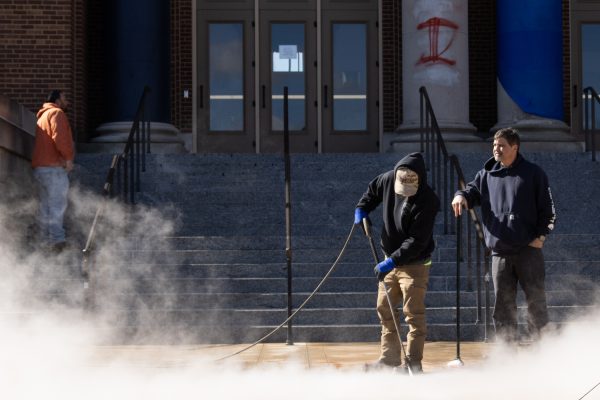State Medicare changes explained for seniors at Lincoln Square Mall
September 19, 2005
The “Illinois Cares Rx Caravan” came to Urbana Saturday to talk to senior citizens about changes in Medicare policies.
The informational fair is a part of a statewide effort to introduce and explain the improvements Gov. Rod Blagojevich made to prescription drug coverage. Administrators set up information tables Saturday morning at Lincoln Square Mall, where senior citizens could ask questions about the changes that will start Oct. 1.
Bryan Padget, the outreach coordinator of the Illinois Senior Health Insurance Program, said the program is attempting to educate the crowd on Blagojevich’s new medical policy where “no senior citizen or person with disabilities gets left behind.”
The new plan is available for all people with Medicare. It now covers both brand name and generic prescription drugs and offers extra help for those who have low income, Padget said.
Padget said the Caravan is going to hit every major Illinois area, so senior citizens can better understand the changes and its benefits.
Get The Daily Illini in your inbox!
The more information given the better because health insurance is very complex and always changing, said Martha Paap, a senior program coordinator of the Senior Health Insurance Program at Provena Covenant Medical Center.
Paap said there are some senior citizens who are too sick to comprehend the details of health care and have no one to explain it to them.
In addition to this informational fair, Provena has trained advocates who can assist in such matters, as well as provide one-on-one counseling, make house visits and help in billing issues, said Paap.
“They need (the assistance) desperately,” she said.
Christie Huth, of Champaign, said she came to the forum to get information for her mother, who was concerned that the changes would limit the number of pharmacies where she could get her medication.
Huth said although she has learned that the pharmacies will not be affected, she is disappointed that the new system operates under individual companies, instead of just Medicare.
She said her mother now has to choose a plan, which may involve paperwork that could be too overwhelming and confusing for an 80-year-old woman.
At the fair, there was also the discussion of being penalized monetarily if not enrolling in the program as soon as a person is eligible to do so.
Byron Miller, of Urbana, said he is glad to be warned about the penalty, but still does not completely understand the new plan after watching the presentation.
“It was somewhat a lot of information in a short time,” Miller said.
Colleen Berman, of Urbana, said the whole change is creating anxiety for her parents because there is so much pressure to make a decision, but the process to choose different plans, costs and procedures is so complicated.
“Options are good, but it almost seems like there’s too many,” Berman said.
The Illinois Office of Attorney General also had a table at the fair to inform the citizens about potential insurance fraud.
Micah Roderick, program specialist of the Attorney General’s office, told the crowd to pay attention to charges on their bills and to not give any personal information to marketing companies.
Roderick said some marketing companies have begun selling new insurance plans before the Oct. 1 start date, as well as accepting payments before the Nov. 15 date set by the government.
“When new plans come out, the criminals come out as well,” Roderick said.
Illinois Cares is a unique program that no other state is doing, said Padget. He said there would be more local town hall meetings to answer all concerns.
“I hope that everyone here leaves with better understanding and knowing there are people in this community to help in this process,” Padget said. “They are not alone.”





